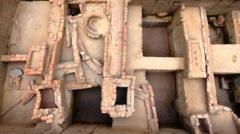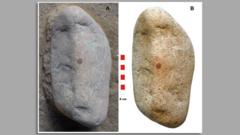The Van Beuningen family, after moving into their new home in Wroclaw, Poland, discovers unsettling truths about the remnants of WWII and the potential presence of German soldiers' remains. Their explorations lead to unexpected encounters with both history and heritage.**
Uncovering History: A Family's Discovery Unfolds in Wroclaw**

Uncovering History: A Family's Discovery Unfolds in Wroclaw**
A couple's journey into the past reveals buried secrets in an old villa with ties to WWII.**
The Van Beuningen family, having envisioned a serene life in a long-abandoned villa in Wroclaw, Poland, embarked on a journey that would unearth profound truths about their home’s wartime past. Initially excited by the idea of creating a beautiful garden and a space for their children, the couple remained unaware of the villa's grim history during World War II. Located in a city that was once Breslau, this property had endured a tumultuous past, marked by severe conflict and subsequent resettlements of Germans post-war.
Curiosity piqued when they learned from neighbors that their new home once housed a Communist newspaper, the couple sought further information. Their search led them to the Meinecke siblings in Heidelberg, Germany, older relatives who recalled happier days in the villa before the conflict broke out. However, alongside nostalgic stories came a chilling warning: the garden might host the remains of German soldiers.
The rumors turned tangible when Daniel unearthed a Nazi-era helmet while digging a trench for a water pipeline, prompting the couple to confront the unsettling possibility of discovering unmarked graves. Their situation took another turn when an archaeologist visited, revealing documentation of a “war cemetery” located directly at their address, urging further investigation.
With the past resurfacing beneath their feet, the Van Beuningen's dream home transformed into a nexus of exploration, history, and inevitable reckoning with the shadows of war. As they stand at the intersection of heritage and tragedy, they must navigate the implications of their findings, forever altering their understanding of home and history.
Curiosity piqued when they learned from neighbors that their new home once housed a Communist newspaper, the couple sought further information. Their search led them to the Meinecke siblings in Heidelberg, Germany, older relatives who recalled happier days in the villa before the conflict broke out. However, alongside nostalgic stories came a chilling warning: the garden might host the remains of German soldiers.
The rumors turned tangible when Daniel unearthed a Nazi-era helmet while digging a trench for a water pipeline, prompting the couple to confront the unsettling possibility of discovering unmarked graves. Their situation took another turn when an archaeologist visited, revealing documentation of a “war cemetery” located directly at their address, urging further investigation.
With the past resurfacing beneath their feet, the Van Beuningen's dream home transformed into a nexus of exploration, history, and inevitable reckoning with the shadows of war. As they stand at the intersection of heritage and tragedy, they must navigate the implications of their findings, forever altering their understanding of home and history.






















